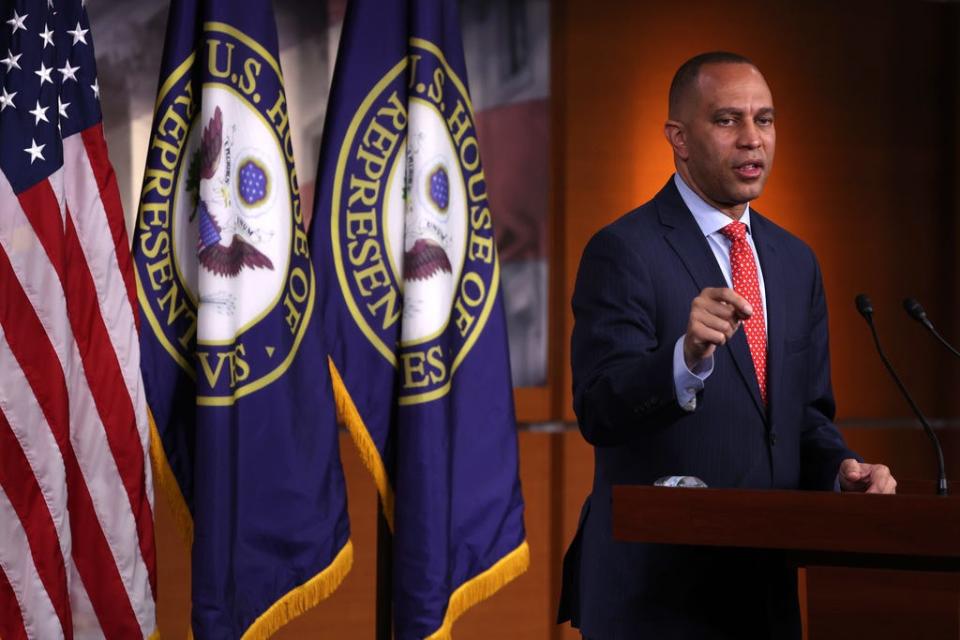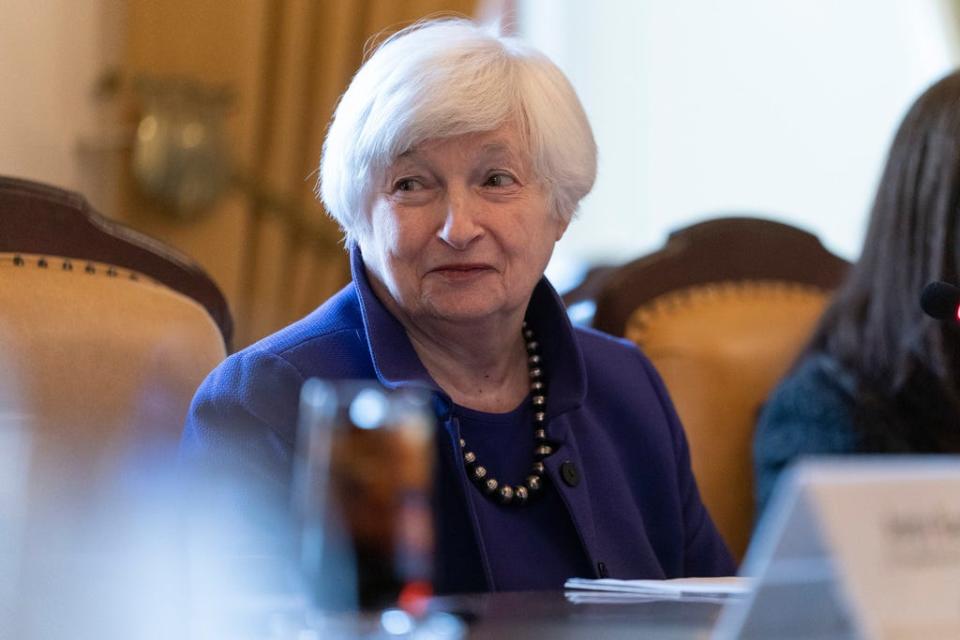House Dems move forward with secret plan to pay America's bills. How the debt limit fight affects you
- Oops!Something went wrong.Please try again later.
WASHINGTON−House Democratic Leader Hakeem Jeffries is done waiting on Republicans.
He's moving forward with a plan to "stop right-wing extremists from triggering a dangerous default on America's debt."
Republicans who refuse to raise the debt limit are the "right-wing extremists" Jeffries is referring to, though House Republicans may disagree with his assessment because they passed a bill last week to do just that.
But the bill that passed April 26 had strings attached −$4.5 trillion worth of spending cuts in exchange to raise the government's borrowing power and avoid the first default in U.S. history. It's a bill Senate Majority Leader Chuck Schumer described as "dead on arrival" and President Joe Biden said he would veto.
House Democrats began taking steps Tuesday to bypass Republicans and force a vote on a debt limit increase. It's the latest salvo in the fight to pay America's bills.
Deep cuts: White House says GOP debt ceiling plan would cause largest VA benefits cuts in US history

How House Dems are trying to force a debt limit vote
House Democrats are using a discharge petition − a rarely used procedural move to get a bill out of committee − to force a vote with support from 218 members. It would require the support of the entire Democratic caucus and at least five Republicans willing to cross party lines.
In a letter to colleagues Tuesday, Jeffries said House Democrats are using "all options at our disposal to avoid a default."
"The filing of a debt ceiling measure to be brought up on the discharge calendar preserves an important option. It is now time for MAGA Republicans to act in a bipartisan manner to pay America's bills without extreme conditions," he said.
Democrats introduced an emergency rule Tuesday that allows them to begin collecting signatures May 16 on a discharge petition that could force a vote on their bill − if they can get a handful of Republicans to join them.
Some Senate Republicans are encouraging House Republicans to hold the party line. "House Republicans: don't defect!" Sen. Mike Lee, R-Utah, said in a tweet.
'They produced a ransom note' Hakeem Jeffries blasts House GOP debt limit plan, wants real budget
What's the secret plan?
The vehicle for the vote is a bill from Rep. Mark DeSaulnier, D-Calif., filed on Jan. 30.
The title − The Breaking the Gridlock Act − could have given it away. But the legislation wasn't focused on the debt crisis. It included so many Democratic wishes, from a task force to help grandparents raising grandchildren to a grant program to protect nonprofits against terrorist attacks, that it was referred to 20 committees.
Being referred to all those committees, sitting without action for months, is how Democrats are now able to use this shell of a bill to use the discharge petition. A bill has to sit in committee for at least 30 days to trigger a discharge petition.
And being introduced by DeSaulnier, a lesser known congressman compared with leaders like Jeffries, also helped the legislation fly under the radar.
What the debt limit fight means for you

Treasury Secretary Janet Yellen said Monday that the U.S. could run out of money to pay its bills as soon as June 1.
Biden shortly thereafter invited the top four congressional leaders − House Speaker Kevin McCarthy, R-Calif.; Jeffries, D-N.Y.; Schumer, D-N.Y.; and Senate Minority Leader Mitch McConnell, R-Ky. − to the White House on May 9 to discuss the debt limit. McCarthy accepted the invitation, ending a three-month stall in negotiations.
But the warning from Yellen did little to move the two parties closer. Many Republican lawmakers said Tuesday that there's no way they will vote to raise the debt limit without spending cuts.
If the government defaults on its debt – something the U.S. has never done - financial markets could tank, hurting 401(k)s and other investments. It would mean higher home and auto loan rates and credit card payments, economists have warned, and could stop payments on government programs such as Social Security and military salaries. Bondholders would not be paid what they're owed on time, and a domino effect could trigger a recession and stock market crash, economists have said.
Since 1960, Congress has acted 78 times to permanently raise, temporarily extend or revise the definition of the debt limit – 49 times under Republican presidents and 29 times under Democratic presidents, according to the Treasury Department.
'The clock is ticking' House Speaker Kevin McCarthy to meet with President Joe Biden on debt limit
This article originally appeared on USA TODAY: House Dems take steps to force debt limit vote, pay America's bills

